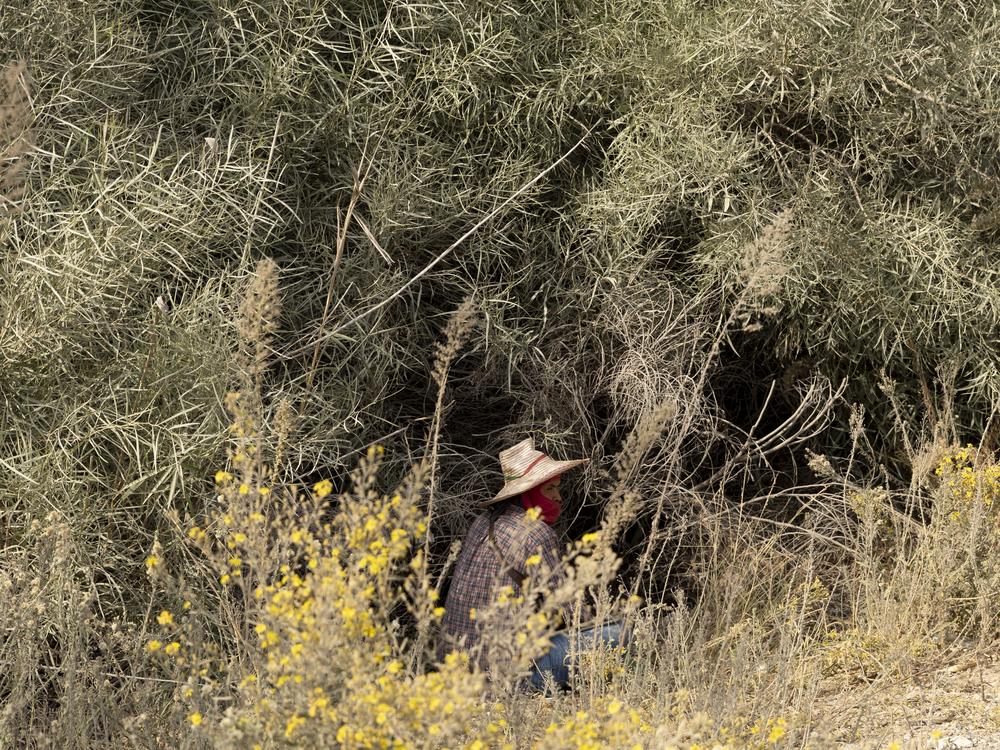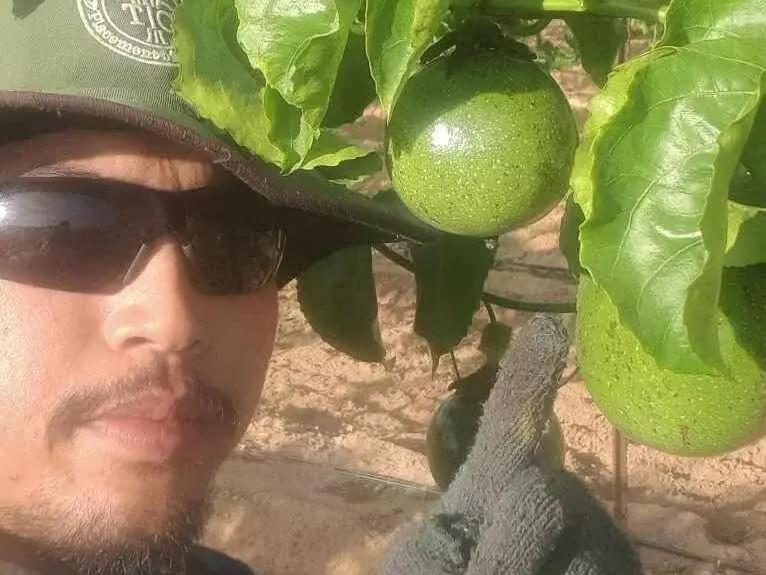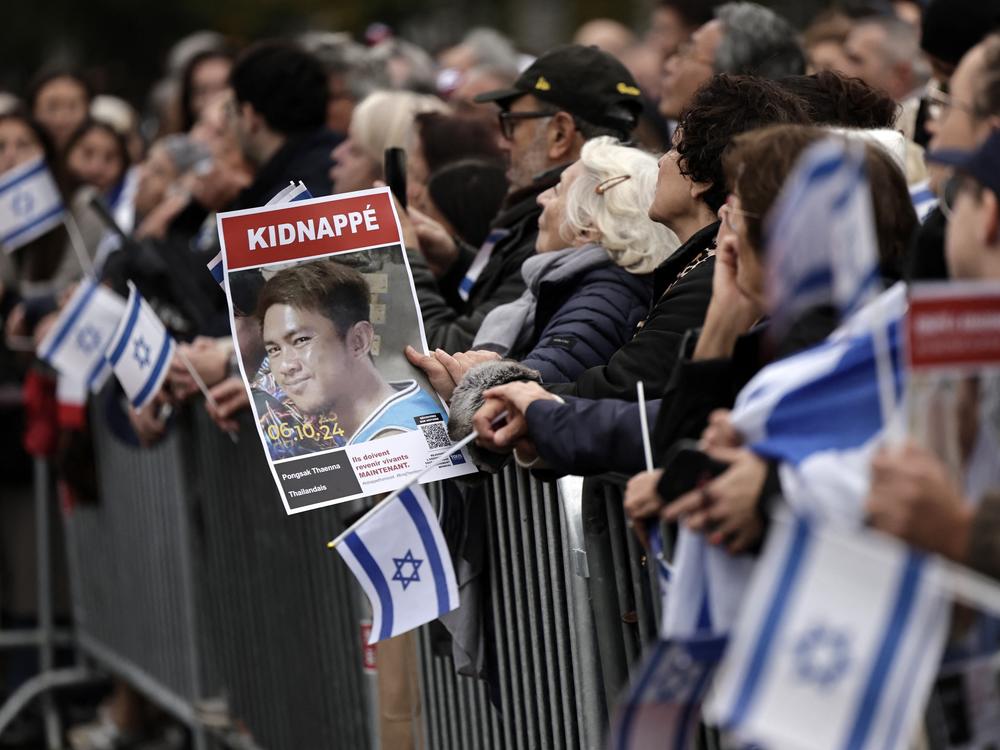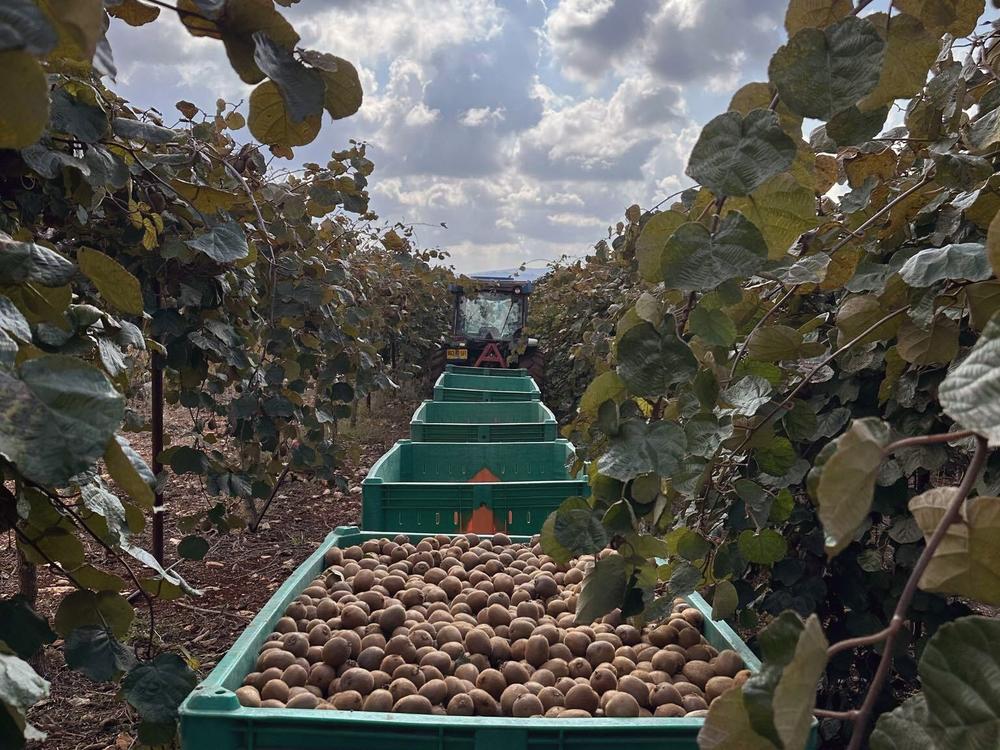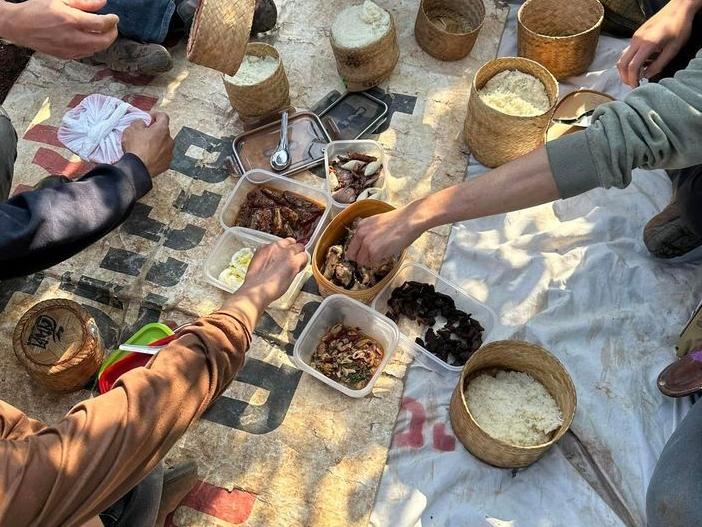Section Branding
Header Content
In northern Israel, migrant workers are farming while under fire from Hezbollah
Primary Content
TEL AVIV, Israel — Ubon Namsan says he's become used to the loud whoosh that signals an incoming rocket from Hezbollah in Lebanon, a country only a few thousand feet north of the Israeli kiwi orchard where he sifts through leafy rows of vines hand-picking the ripe fruit.
Like the vast majority of the 30,000 foreign farm laborers in Israel, Namsan is from Thailand. These days, he and four other Thai men in his group spend most of their time working in a 7-kilometer (4.3-mile) sliver of rugged, hilly terrain adjacent to the Lebanese border. When the rockets fly, they scramble to a shelter in the basement of a nearby farm building.
Namsan and the others work in an area that Israel has declared off-limits to its own civilians, ordering them to evacuate last month amid ongoing military operations against Hezbollah, the Iran-backed group in Lebanon. Even so, with permission from Israel's military, farm owners and the foreign laborers they employ continue to work in that area, tending fields and livestock.
Although agriculture has steadily fallen as a percentage of Israel's GDP in recent years, the country is famous for its produce. Agricultural exports to such markets as the European Union and the United States were valued at nearly $2.5 billion in 2021.
For Namsan, 28, the work means wages that are easily three times what he could make back home. The average $1,500 a month he earns is a huge incentive, even if it means working on a battlefront. On top of that, he gets an extra $80 each month as a premium for working in what Israel has classified as a restricted military zone.
"I know it's dangerous because it's close to the border," he says, speaking to NPR through an interpreter via a social-media app. "But I'm not scared anymore."
He's had time to adjust to Israel's war zones. NPR spoke with Namsan last year, after the Oct. 7 Hamas attack that took place very near where he was working just outside of Gaza. Israel says more than 1,200 people were killed that day, among them 66 foreign laborers — most of them Thai.
Another 251 people were taken hostage, including 31 Thai agricultural workers and a Filipino caregiver. Although most of the foreigners were subsequently released, Israeli authorities say two Thai captives and a Tanzanian student are now listed as dead. Six Thais and a Nepali agricultural student are believed still being held inside Gaza.
In the immediate aftermath of the attack, Namsan was one of some 7,000 Thai laborers in Israel who went home to Thailand, as part of an emergency airlift organized by their government. Like him, many decided to return to Israel. Hezbollah began firing on Israel a day after the attack as a show of support for Palestinians in Gaza, where health officials say more than 43,600 Palestinians have been killed by the Israeli military since last October.
Namsan says his family is grateful for the money he sends home to northeast Thailand, a largely impoverished region where rice cultivation predominates. They also understand the dangers he faces.
"They support me. If I want to stay, I stay. If I want to go home, I go home. The decision is mine," he says.
At one point as he's speaking, Namsan suddenly breaks off the conversation to run for a nearby shelter as a salvo of rockets streaks overhead. He counts about 10 and says Israeli missiles intercepted all of them. He and his coworkers are safe.
For others, though, the willingness to farm under fire has had deadly consequences: in October, a Thai laborer working near Israel's northern border was killed when previously unexploded ordnance detonated under a tractor he was driving. That same month, an Israeli farm owner and four Thai workers were killed, with a fifth laborer badly hurt, after Hezbollah rockets landed in a field near the northern Israeli town of Metula. And in March, an Indian laborer was killed and two others injured when an anti-tank missile fired from Lebanon exploded near the northern border community of Margaliot.
There are about 137,000 foreigners working legally in Israel, not only from Thailand but also dozens of other countries, including the Philippines, Moldova and Ukraine, according to Israel's Population and Immigration Authority. They are employed in jobs that don't interest most Israelis — ranging from child care to construction.
Namsan says the farm owner he now works for has always clearly explained the dangers and given him and his coworkers the option not to work in risky areas. But he's heard that other Thai laborers don't get a choice.
Under Israeli law, foreign workers have the right to switch employers, according to Aelad Cahana, a lawyer with Kav LaOved, a nonprofit organization that advocates for labor rights in Israel. But Cahana acknowledges that few Thai workers speak Hebrew or English, and for them, changing jobs can prove difficult. "Contacting a farmer in a different place is very hard," he says.
He says foreign workers on farms are especially vulnerable because they work in the open. "There is no safe zone that you can get to, even if you have two seconds, you cannot get anywhere. You're just in the middle of the field."
The story is much the same elsewhere along the border. In the evacuated Israeli village of Shtula, situated directly on the border with Lebanon about an hour by road from Metula, Thai workers are given hazard pay to operate a large chicken coop. They work next to a similar enclosure that was destroyed several months ago by a Hezbollah rocket that killed thousands of chickens. Their job is considered vital because Shtula provides the majority of the region's eggs.
The Thais are "very afraid to be here," says Shlomi, a security squad leader for the village who is affiliated with the Israeli military and was not authorized to give his full name due to his role patrolling the border in the line of Hezbollah fire.
Following last month's deaths near Metula, a member of a security squad told Haaretz newspaper that the army had allowed the workers to access the area, despite it being closed to civilians. Israel's military tells NPR that "requests from farmers for agricultural work in closed military zones are reviewed. Based on situational assessments, exceptions are made to permit agricultural work in restricted military areas."
Days after the Thai laborers were killed in Metula, Thailand sent a letter of protest to Israel calling for a stop to its nationals being sent to work in high-risk areas. Thailand's Ambassador Pannabha Chandraramya also reached out to Israel's Interior Minister Moshe Arbel, asking that foreign agricultural workers stop being employed inside the "confrontation line," which marks the military's no-go area near Lebanon.
Asked if foreign workers are still being employed in those restricted areas, Israel's Interior Ministry referred NPR to recent comments by Arbel pledging that the government would "intensify enforcement against employers of foreign workers in evacuated workers."
"The duty to protect every human life outweighs the need to turn on drip irrigation in an evacuated agricultural area," Arbel said after meeting with Chandraramya last week.
Uri Dorman, secretary-general of the Israel Farmers' Federation, says that despite Arbel's comments, the army continues to grant permission for owners to access their lands on a case-by-case basis. "There was a lot of attention given to the interior minister's remarks, but only the [Israeli military] can give us permission," he says. He is quick to point out — as evidenced by the death of the Israeli farm owner in Metula — that the risk is shared between the farmers and the foreign laborers they employ.
Cahana, of the laborers' rights group, says despite Arbel's promises to the contrary, "in practice" foreign workers are still employed inside the restricted zone.
However, there are signs that Israel may be nearing completion of its operation inside Lebanon. Defense Minister Israel Katz said Sunday that Israeli forces had been "victorious" against Hezbollah and "eliminated" Hamas. It's not known whether that will mean an end to the daily rain of rockets that threaten the lives of farmers and farm laborers in the north.
Namsan doesn't think he will be leaving northern Israel anytime soon. "There are still a lot of farms left to harvest here," he says.
He recently posted a video to Facebook of smoke billowing from a field as warplanes can be heard thundering overhead. The caption reads: "This is what my job is every day next to the border."
NPR's Daniel Estrin reported from Shtula, Israel near the Lebanon border. Yanal Jabarin contributed from Tel Aviv and Wassana Laisukang from Washington, D.C.
